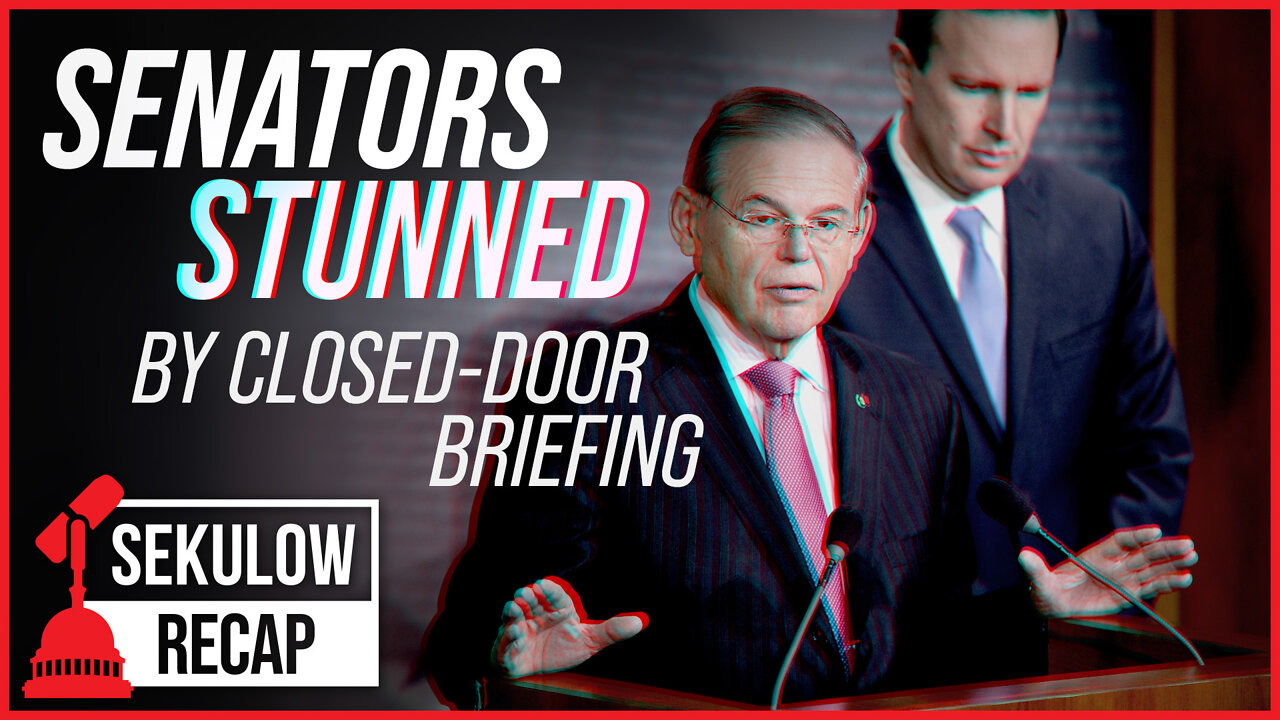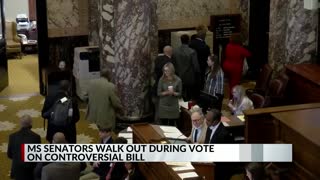Premium Only Content

This Is Why Senators Were Left STUNNED After Closed-Door Briefing
In a classified briefing with Senators, Special Envoy Rob Malley reportedly admitted that “Iran could make enough material for nuclear bomb in ‘weeks.’” That is the United States’ assessment, and yet we still have our negotiators in Vienna trying to make a deal to reenter the Joint Comprehensive Plan of Action (JCPOA), otherwise known as the flawed Iran nuclear deal. Additionally, just last week President Biden gave Iran civilian nuclear sanction relief and unfroze $29 billion of Iran’s frozen funds held overseas.
Why has the U.S. not pledged that we will never allow this radical terrorist regime to possess a nuclear weapon?
The Biden Administration is starting to realize just how dangerous these terrorist regimes are. The latest terrorist group that they are reevaluating is the Houthi rebels. The Biden Administration immediately removed this group from the terrorist watch list upon taking office. Now, the Biden Administration is having second thoughts and is in the works of placing them back on the list.
White House Press Secretary Jen Psaki tried to explain where the Biden Administration stands on Iran’s nuclear advances:
"Well in terms of where things stand: Special Envoy Malley and his interagency delegation have been in Vienna for the eight rounds of talk. As we’ve said, our talks with Iran have reached an urgent point. A deal that addresses the core concerns of all sides is in sight, but if it’s not reached in the coming weeks, Iran’s ongoing nuclear advances will make it impossible for us to return to the JCPOA."
We don’t even know what reentry would look like at this point. ACLJ Director of Government Affairs Thann Bennett explained the history of the JCPOA:
"It is so circular. Look, I remember the history on this. If you think back to the negotiations over the JCPOA and by the way the Iranian Nuclear Review Act, which at the time I didn’t think this was nearly strong enough . . . I agreed . . . that this deal should be treated like a treaty, not just a common piece of legislation referred to the United States Senate. Let’s go back to the terms of this original deal. That original deal relied on self-inspection, so Iran got to inspect their own facilities. When they did let officials in, they had to give 24 hours’ notice, so they could clean up the site before those officials acted. There was no real enforcement. . . . All of the so-called enforcement inside the deal even if you believed Iran was going to abide by it, they have all sunset. We are in the phase now where all of those restrictions would have been sunsetting anyway. . . . If it’s the same terms that entire deal would be ready to sunset . . . it is worth nothing now."
Left-leaning Senator Bob Menendez even called out the Biden Administration for continuing these talks:
"Today I call the Biden Administration and the international community to vigorously and rigorously enforce sanctions, which have proved to be among our most potent tools for impacting Iran’s leaders and the IRGC. We cannot allow Iran to threaten us into a bad deal or an interim agreement that allows it to continue to build its nuclear capacity. Nor should we cling to the scope of an agreement that it seems some are holding on to for nostalgia’s sake. As I said seven years ago, hope is not a national security strategy."
Today’s full Sekulow broadcast is complete with more in-depth analysis of Iran’s nuclear program.
-
 59:46
59:46
American Center for Law and Justice
5 days agoFight Breaks Out in Senate Over Trump Nomination
14.6K23 -
 0:30
0:30
One America News Network
3 years agoWeekly Briefing: Senators thoughts after the Ariz. audit hearing & MORE!
2.96K7 -
 41:31
41:31
WXYZ
3 years agoOfficials hold evening briefing after Oxford High School shooting
69 -
 7:53
7:53
American Center for Law and Justice
3 years agoSenators Go After Biden’s Funding Of Terrorists
1.27K7 -
 0:10
0:10
ViralHog
3 years agoWoman Stunned After Door Handle Snaps Off
2361 -
 2:31
2:31
Resist the Mainstream
2 years agoDemocrat State Senators Walk Out After Republicans Introduce Bill Banning CRT in Schools
16.5K32 -
 LIVE
LIVE
The Quartering
2 hours agoBenny Johnson Backlash, Unhinged NFL Fan Gets Instant Karma, Tiktok Bought By Elon & More!
4,638 watching -
 1:40:52
1:40:52
Russell Brand
2 hours agoCalifornia Burns! Who’s Really to Blame? – SF519
39.4K41 -
 LIVE
LIVE
The Officer Tatum
1 hour agoLIVE: Pete Hegseth DESTROYS Leftist at Confirmation Hearing! + MORE Officer Tatum Show EP 41
2,358 watching -
 1:58:28
1:58:28
The Charlie Kirk Show
2 hours agoThe Hegseth Confirmation Hearing | Larsen, Dr. Marshall, Halperin | 1.14.2025
103K52